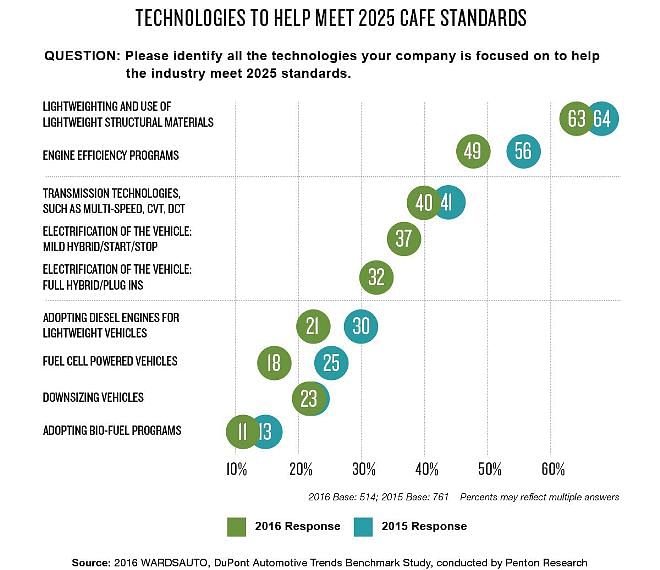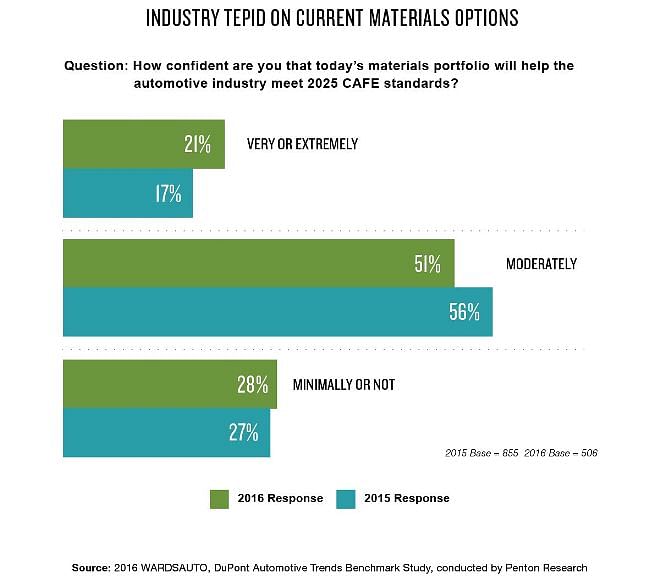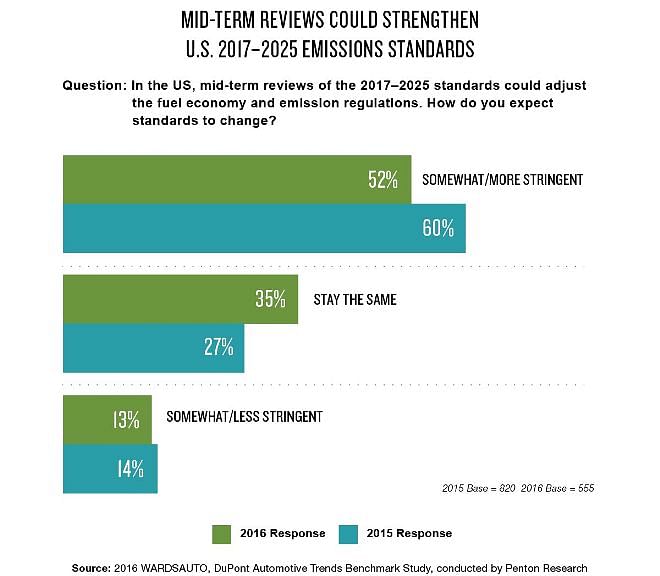Lightweighting remains top focus for automakers to meet CAFE standards
The recent findings were part of the annual WardsAuto survey, sponsored by DuPont Automotive. The survey also showed electrification as an increasingly mentioned technology focus by the respondents.
Taking weight out of vehicles and engine efficiency programs continue to top the list of strategies for automakers as the industry looks for ways to meet 2025 CAFE (Corporate Average Fuel Economy) standards.
The recent findings were part of the annual WardsAuto survey, sponsored by DuPont Automotive. The survey also showed electrification as an increasingly mentioned technology focus by the respondents.
Commenting on the survey’s findings, Brian Fish, NA automotive marketing manager, DuPont Performance Materials said, “It’s no surprise to learn that lightweighting and the use of lightweighting structural materials continue to top the list of strategies the industry remains focused on. Lightweighting can be applied to virtually every component and part and we continue to work with the industry to look for opportunities to reduce weight across systems.”
CAFE Outlook
With the mid-term review of the 2025 CAFE Standards scheduled through 2017, 87 percent of the respondents say they expect the standards for fuel economy and emissions to become more stringent or remain the same. At the same time, 90 percent say low gas prices in combination with slow sales of fuel efficient, low-emissions vehicles will continue to impact programs aimed at meeting CAFE regulations.

Now in its sixth year, the DuPont-sponsored survey with WardsAuto was conducted by Penton Market Research, Overland Park, Kan. The 600-plus respondents work for system, component or parts manufacturers, automakers, engine or engine-service companies or in automotive-related industries. Most represent engineering, design, manufacturing, marketing, sales and corporate management.
Among the questions in the survey, respondents were asked to identify technologies that their companies are focusing on to help meet the 2025 standards. A majority of respondents (63 percent) are focused on lightweighting and the use of lightweight structural materials and nearly half (49 percent) are focused on engine efficiency programs.

While lightweighting was at the top of the technology focus area, powertrain and chassis continue to remain as the top two vehicle systems that automakers target for lightweighting. Of the respondents, 44 percent mentioned powertrain and chassis as the primary areas for lightweighting.
The light-duty vehicle CAFE and GHG (greenhouse gas) emissions rate standards require, on an average industry fleetwide basis, 163 g/mile of CO2 in model year 2025, which would be equivalent to 54.5 mpg (4.3L/100km) if this level were achieved solely through improvements in fuel efficiency. However, 54.5 mpg is a non-adjusted theoretical laboratory compliance value that does not include special credits for such things as high-efficiency air-conditioning systems and active grille shutters that improve vehicle aerodynamics. Most experts believe 54.5 mpg will translate to about 40 mpg in real-world fuel economy.
Materials Focus
Respondents continue to be only moderately confident that the current portfolio of materials will help the industry meet the looming standards. “Investing in the development of innovative and high-performance materials is a key strategy for DuPont. We continue to actively partner with the automotive design and engineering community to find new solutions to reduce vehicle weight,” said Brian Fish.

According to the survey respondents, the most relied upon material families to help meet the CAFÉ standards are aluminum (25 percent) and multi-material solutions (21 percent). Advanced composites, engineered plastics and advanced high-strength steel were the top 2nd tier choices with all 3 materials combining for 39 percent of the respondent’s choices.
DuPont Performance Materials (DPM) is a leading innovator of thermoplastics, elastomers, renewably sourced polymers, high-performance parts and shapes, as well as resins that act as adhesives, sealants, and modifiers.
RELATED ARTICLES
Isuzu unveils D-Max EV at 2025 Commercial Vehicle Show
Revealed at the 2025 Commercial Vehicle Show in Birmingham, the Isuzu -Max EV is the first fully electric commercial pic...
Hyundai unveils next−gen highly efficient hybrid system
The next-gen hybrid system is claimed to offer 45% better fuel efficiency and 19% more power compared with ICE powertrai...
Horse Powertrain reveals hybrid conversion for electric cars
Engine-making joint venture of Geely and the Renault Group announces new hybrid powertrain that fits into the same space...






 By Autocar Professional Bureau
By Autocar Professional Bureau
 09 Aug 2016
09 Aug 2016
 5176 Views
5176 Views









